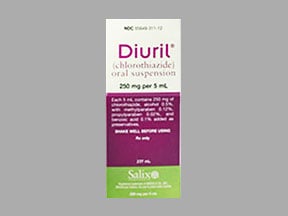
Diuril Coupons & Savings Card – Discount Prices from $59.66
My prescription
Edit
237ML of 250MG/5ML, Diuril (1 Bottle)
Select pharmacy

CVS
$103.07
COUPON PRICE
Walmart
$59.66
COUPON PRICE
Walgreens
$70.65
COUPON PRICE
Albertsons
$79.10
COUPON PRICEDiuril savings card
Show this card to your pharmacist
Walmart
$59.66
BIN
ID
PCN
GRP
019876
LHB4C91172
CHIPPO
LHX
Powered by
Related thiazide diuretics prescriptions
More prescriptions for hypertension
Related thiazide diuretics prescriptions
More prescriptions for hypertension
Price history for Diuril
1 Bottle, 237ML of 250MG/5ML
Average retail price for Diuril
Average SaveHealth price for Diuril
Our price history data is based on aggregated prescription data collected from participating pharmacies in America. Our prescription data updates daily to reflect the latest price changes. If you notice a missing data point, it means there wasn't sufficient data available to generate a monetary value for that date.
*Retail prices are based on pharmacy claims data, and may not be accurate when we don't have enough claims.
Diuril dosage forms
Dosage Quantity Price from Per unit 237ML of 250MG/5ML 1 Bottle $59.66 $59.66 237ML of 250MG/5ML 2 Bottles $138.30 $69.15 237ML of 250MG/5ML 3 Bottles $216.95 $72.32
| Dosage | Quantity | Price from | Per unit |
|---|---|---|---|
| 237ML of 250MG/5ML | 1 Bottle | $59.66 | $59.66 |
| 237ML of 250MG/5ML | 2 Bottles | $138.30 | $69.15 |
| 237ML of 250MG/5ML | 3 Bottles | $216.95 | $72.32 |
What is the drug DIURIL used for?
Diuril is used to treat high blood pressure and fluid retention (edema) associated with conditions such as heart failure, liver disease, or kidney disorders. It helps the body get rid of excess salt and water by increasing urine production.
Is DIURIL the same as hydrochlorothiazide?
DIURIL and hydrochlorothiazide are not the same. DIURIL is the brand name for chlorothiazide, while hydrochlorothiazide is a different thiazide diuretic. Both medications are used to treat high blood pressure and fluid retention, but they are distinct compounds.
Does DIURIL lower sodium?
Yes, Diuril (chlorothiazide) can lower sodium levels in the body. It is a thiazide diuretic that works by increasing the excretion of sodium and water through the urine, which can lead to a decrease in sodium levels. It is important for patients to have their electrolyte levels monitored while taking this medication.
Is DIURIL a controlled substance?
Diuril is not a controlled substance. It is a prescription medication used as a diuretic to treat high blood pressure and fluid retention.
What is the generic name for diuril?
The generic name for Diuril is chlorothiazide.
